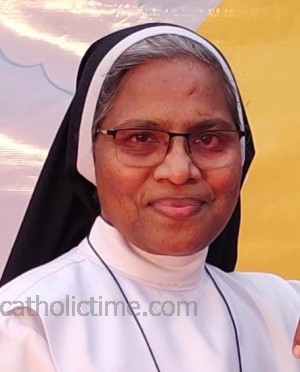
Photo Credit : MuhammadAmdadHossain, CC BY-SA 4.0, via Wikimedia Commons
Today’s Commemoration of All the Faithful Departed, reminds me of the fervour and piety with which we prayed for those who went ahead of us. Yes, the tolling of church bells and making multiple visits to the Church praying for the dead and a different feeling all together. While at the end of 1st November night and mornings of 2nd November, we would find our belongings missing in the name of the dead done for fun while those that took revenge!
The first mention of a day specially dedicated to commemorating all the faithful departed is found in a monastic rule attributed to Saint Isidore of Seville (died 636), who ordered his monks to celebrate the Eucharist for the souls of the departed on the Monday after Pentecost. The choice of this day may be due to the fact that the emerging feast of All Saints was celebrated on the Sunday after Pentecost, following some examples from the Christian East.
In 998 St Odilo of Cluny set aside the day immediately following All Saints (2nd November) as a day when “the monks at Cluny would keep with joyous affection the memory of all the faithful departed who have lived from the beginning of the world until the end”. The custom spread to England and to Spain. In Valencia, the custom of saying three Masses was introduced by the Dominicans in the early 14th century. In 1915, during World War I, Pope Benedict XV extended the feast and granted the privilege to all priests of celebrating three Masses on All Souls Day: one for the faithful departed; one for the priest's intentions; and one for the intentions of the Holy Father.
The feast draws on the Catholic doctrine of Purgatory, which itself draws on the practice of praying for the dead. While the Church believes that all those who die in God’s grace and friendship can be sure of eternal life, nevertheless after death they undergo a purification to achieve the holiness necessary to enter heaven (Catechism of the Catholic Church(CCC) 1030-32). The CCC also invokes the communion of saints, the teaching on indulgences and the Church’s treasury of spiritual goods (CCC 1476-7) to support the application of indulgences by those still on earth to the souls in purgatory.
The doctrine of the communion of saints as traditionally explained, this doctrine means that each of the three divisions of the Church –the Church Triumphant (all the saints in heaven), the Church Militant (all those still alive on earth) and the Church Suffering (all the souls in purgatory) can help the others by their merits and prayers.
On All Souls Day, we not only remember the dead, but we apply our efforts, through prayer, almsgiving, and the Mass, to their release from Purgatory. There are two plenary indulgences attached to All Souls Day, one for visiting a church and another for visiting a cemetery.
The plenary indulgence for visiting a cemetery can also be obtained every day from November 1-8, and, as a partial indulgence, on any day of the year. While the actions are performed by the living, the Militant Church, the merits of the indulgences are applicable only to the souls in Purgatory. Since a plenary indulgence removes all of the temporal punishment for sin, which is the reason why souls are in Purgatory in the first place, applying a plenary indulgence to one of the Holy Souls in Purgatory means that the Holy Soul is released from Purgatory and enters Heaven.
Praying for the dead is a Christian obligation and the Church devotes the month of November to prayer for the Holy Souls in Purgatory, and participation in the Mass of All Souls Day is a good way to begin the month.
Article by Sr. Molly Fernandes sfn


.png)
.png)
.png)
Comments powered by CComment